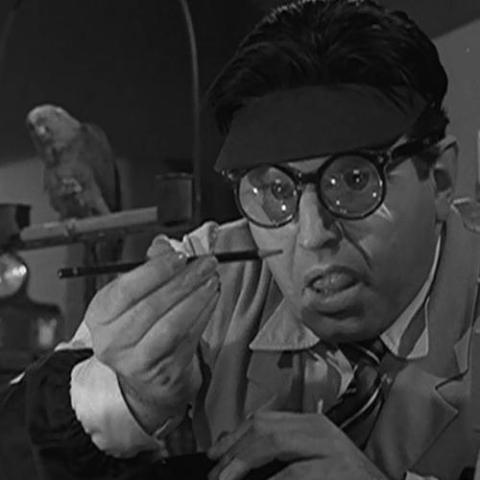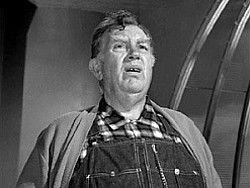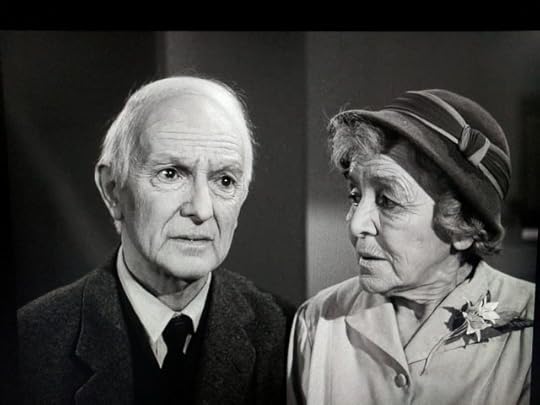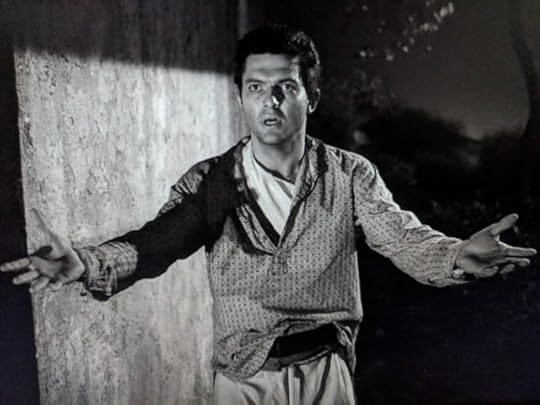September 19, 2024: The Twilight Zone rewatch continues with season 3, episodes 29-32!
Season 3, Episode 29, “Four O’Clock”
This episode first aired April 6, 1962.
This episode was based on a short story by author Price Day that was originally published in the April 1958 issue of Alfred Hitchcock Mystery Magazine and, later, collected in the hardcover anthology “Alfred Hitchcock Presents: My Favorites in Suspense”. The latter was sent to the production offices by Random House who were pitching Rod Serling on a similar Twilight Zone-themed collection. While perusing the anthology, Serling took a shine to Day’s story and had the production make him an offer on the television rights.
Actor Theodore Bikel, who played Oliver Crangle, built a career playing villains onscreen. He received an Academy Award nomination for his performance in The Defiant Ones (1958) and received two Tony nominations for his work on Broadway. Bikel helped created the role of Captain Von Trapp as part of the original Broadway cast of “The Sound of Music”. Rodgers and Hammerstein wrote the song “Edelweiss” specifically for him to perform.
Reflecting back on his Twilight Zone experience, Bikel stated: “As you may rightly assume, my portrayal of Oliver Crangle stayed in my memory much longer than the many parts I have played on TV and elsewhere. It was a superbly written episode and a wonderful character to get my teeth into. Crangle was, of course, politically the very opposite of where my own convictions lie, then and now. To portray a ring wing nut gave me a great pleasure.”
Moyna MacGill, who played Mrs. Williams, was the mother of Angela Lansbury.
Serling’s ability to deliver message episodes ranges from accomplished to bungled and this clunker falls in the latter category. Lots of talk-talk as Crangle plots to shrink his victims down in size, presumably so that they’ll be easier to identify. How, exactly, does he plan to do this remains a mystery. The ending is predictable, but could have been saved if he had been eaten by his parrot but, alas, we didn’t even get that.
Season 3, Episode 30, “Hocus Pocus and Frisby”
This episode first aired April 13, 1962.
This episode was based on an idea by Frederic Louis Fox who also provided the idea for “Showdown with Rance McGrew”. In the original pitch, the main character, Henry Tibbs, is a spinner of tall tales whose outlandish lies are picked up on alien radio. He is offered the opportunity to travel to Mars to pick up residuals owed him but chooses instead to take a around trip around the world via flying saucer. When he returns home, he discovers that, while away, he was awarded first price in the Burlington Liars Contest. Realizing no one will believe his story, he simply doesn’t tell them about his alien encounter. After receiving the story proposal, Rod Serling wrote back: “Mr. Tibbs is a delight. If we go back into production for ten more films, I’ll have one of our people contact your agent. Hang on and don’t lose the faith.”
The flying saucer featured in this episode was from Forbidden Planet (1956). The ship’s inner console, also from the same movie, was reused in The Man from U.N.C.L.E. (1964) and was previously seen in season 1’s “Third From the Sun”.
Actor Andy Devine, who played Somerset Frisby, was a comic actor who owed his career to his trademark raspy voice, the result of a childhood incident that purportedly involved him tripping and falling and having a curtain rod rammed through the roof of his mouth. He co-starred as Jingles P. Jones opposite Guy Madison in Adventures of Wild Bill Hickok (1951) and later hosted the children’s show Andy’s Gang (1955).
Howard McNear, who played Mitchell, portrayed Lloyd the Barber on The Andy Griffith Show (1960). After suffering a stroke that made it difficult for him to use his arms and legs, he returned to the show where the production continued to feature him in close-ups or scenes in which his character was seated. According to fellow actor Don Knotts, McNear was not that different from the colorful character he played on the show.
Dabbs Greer, who played Scanlan, was Reverend Alden on Little House on the Prairie (1974). He was also a series regular on Gunsmoke (1955), Hank (1965), and Picket Fences (1992). His final appearance was in the The Green Mile.
So why exactly was this episode called Hocus Pocus and Frisby? Hocus Pocus suggests magic, yet there was no spellcasting to be had. While I thought Andy Devine terrific and the comedic elements not egregiously cringey, my main gripe with the episode is the rather convenient method by which Frisby escapes his captors. The harmonica felt like a contrived, quick-fix solution to his problem.
All in all, I found this one just so-so.
Season 3, Episode 31, “The Trade-Ins”
This episode first aired April 20, 1962.
This episode was inspired by O’Henry’s 1905 short story “The Gift of the Magi”.
Joseph Schildkraut, who played John Holt in this episode, previously appeared as Alfred Becker in “Deaths-Head Revisited”. His second wife of twenty-nine years passed away during filming but, rather than disrupt production, he insisted on completing work on the final two days.
According to Schildkraut: “I know this might have been mentioned briefly, but to get the reaction on my face when I looked at Alma Platt and realized she was hurting inside, the director wanted to shut off the sound in the studio and then shoot a gun in the background so my look of shock and surprise is real.” Kind of silly, but I’ve been on productions where directors have resorted to cheap tricks like this to get a “better” performance for their actors.
Ted Marcuse, who played Farraday, appeared as Citizen Gregori in “To Serve Man”.
The elderly couple trading in their old bodies for new reminded me of John Scalzi’s Old Man’s War which hinges on a very similar technology. I wonder if he drew inspiration from this episode? It’s a great idea.
I loved the poker scene where Farraday shows sympathy for Holt by allowing him to win that final hand. I did not, however, buy the ending. Didn’t buy that Holt would excitedly tell his wife all of the amazing things they would be able to do given the fact she was still elderly. Didn’t buy his wife’s over-the-top horrified reaction to what he was saying (which was, apparently, supposed to be quite subtle). Didn’t buy his decision to switch back to his original body when he could have just shut up about the holiday plans and got to work earning money for her procedure. Didn’t buy his “A little pain is worth it” excuse when, the scene earlier, the pain was so bad he felt he had no choice but to undergo the procedure. Didn’t buy the “happy ending” given that, in reality, it would be a shortlived, pain-ridden conclusion that could well have been avoided. Did not love.
Season 3, Episode 32, “The Gift”
This episode first aired April 27, 1962.
“The Gift” was originally written as the possible series pilot but the wise decision was made to go with “Where is Everybody?”. Not to be dissuaded, Rod Serling pitched the idea of doing a Twilight Zone movie back in the 60’s and rewrote the script for this episode into a feature screenplay – that ultimate, thankfully, went nowhere.
This episode was previously titled “The Guest” and then “The Visitor”.
This episode, with its clearly religious overtones, aired the week after Easter.
Actor Geoffrey Horne, who played Williams, lost out on the lead role in Ben Hur to Charlton Heston.
Nico Minardos, who played the doctor, reflected back on this episode: “I did some thirty movies over the years and a number of television and of all of those, The Twilight Zone is the one I get more mail about. I’m getting fan mail from Switzerlaned, Ireland, Germany, as well as the United States. In those years we used to rehearse a couple days, and then film for three days. Rod wanted me to do the show and what I remember most was the exctiement we all had of the show We knew it was an allegory to Jesus Christ, which was the premise, and everyone was trying to remain calm for the crowd sequence.”
In 1966, while shooting a scene on the Huallaga River in Peru for a TV movie called “High Jungle”, the canoe Minardos and fellow actor Eric Fleming were in tipped over. Minardos managed to swim back to shore, but Fleming drowned.
In 1986, Minardos was indicted on charges of conspiracy to illegally ship arms to Iran. The indictment was eventually tossed, but the charges nevertheless forced him into bankruptcy and ended his career.
Henry Corden, who played Sanchez, was the second voice of Fred Flinstone, replacing the iconic Alan Reed after he passed.
Vitto Scotti, who played Rudolfo, was last seen in “Mr. Bevis” as a street peddler with a monkey.
Well, here we are. The most boring episode of The Twilight Zone capped with a Christian allegory that doesn’t so much hit you over the head as it punches you repeatedly in the face. Throw in some embarrassingly wooden performances and a smattering of atrocious Mexican accents, and you have the recipe for what is, without a doubt, one of this show’s very worst entries.
The post September 19, 2024: The Twilight Zone rewatch continues with season 3, episodes 29-32! appeared first on Joseph Mallozzi's Weblog.
Joseph Mallozzi's Blog
- Joseph Mallozzi's profile
- 39 followers







